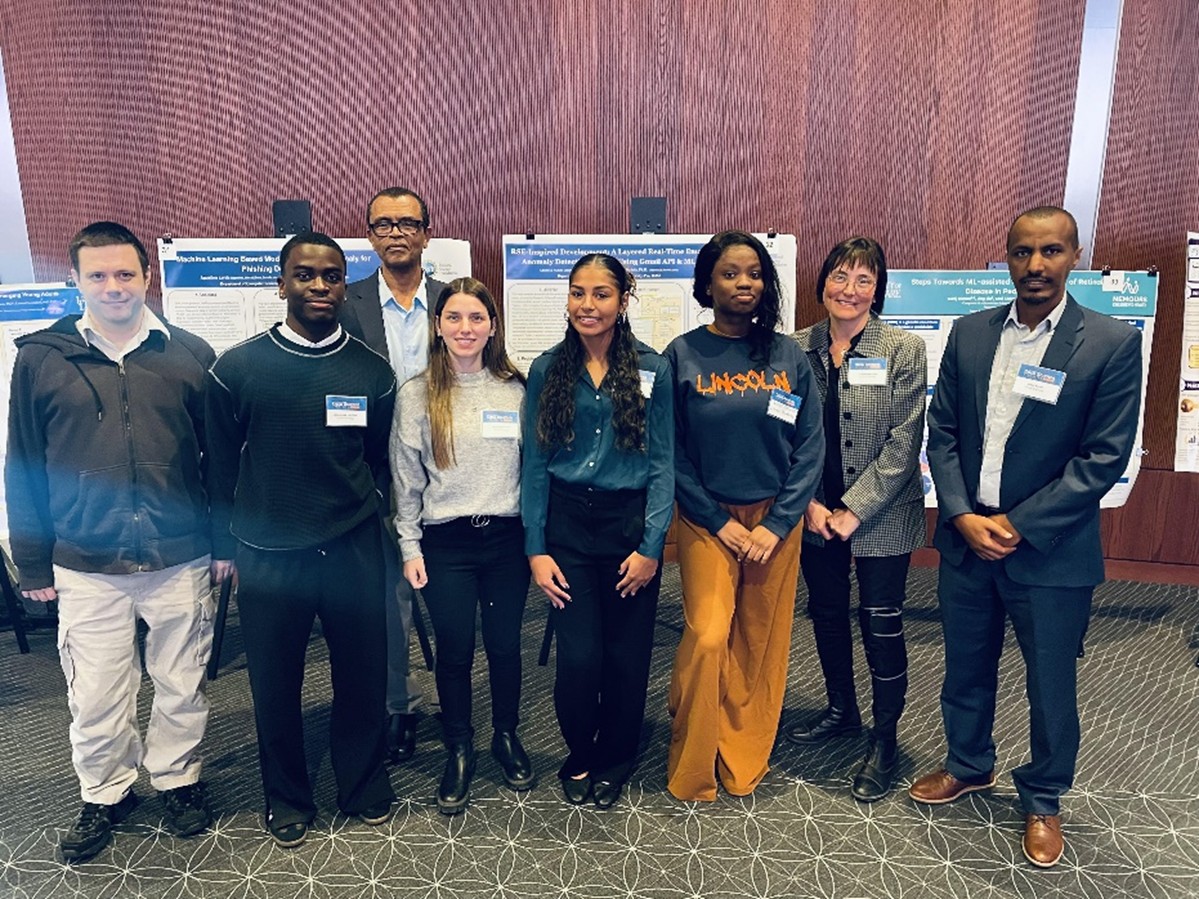
From left to right: Dr. Zaq Carson, Adeoluwa Afolabi, Dr. Dejene Dedefa, Agustina Lorda, Ashley Spencer, Lamoy Spencer, Dr. Christine Limb, Dr. Abel Ayele. (Abdourahim Sylla was not available for the photo.)
Five Lincoln University students from the Computer Science and Mathematical Sciences departments, Adeoluwa Afolabi, Agustina Lorda, Ashley Stringer, Lamoy Spencer, and Abdourahim Sylla, showcased their research at the Delaware Data Science Symposium on October 24, 2025. One of their posters was recognized as the symposium’s sole Best Undergraduate Poster awardee, reflecting the competitiveness of our data science education and research initiatives. The symposium, organized by the University of Delaware’s Data Science Institute, brought together leading researchers, educators, and students from across the region to explore the theme "Leveraging Data Science to Address Societal Challenges". The event featured presentations that applied advanced data science tools to a wide variety of real-world problems in transportation, education, public health, finance, and environmental science. (https://dsi.udel.edu/events/data-science-symposium-2025/).
Agustina Lorda, a senior in Computer Science, presented “Machine Learning Based Modeling of Email Anomaly for Phishing Detection” under the mentorship of Dr. Dejene Dedefa. Her research focused on the Preprocessing and Machine Learning layers of a five-layer modular detection system. Using pandas, TF-IDF, and domain-informed features, raw email data was transformed and stored for training. Supervised models outperformed others: Logistic Regression achieved 97.21% recall and Random Forest 99.17% precision. Augustina also contributed to pipeline integration, demonstrating how layered design enables reproducible detection and instructional reuse. Her poster was recognized as the symposium’s sole Best Undergraduate Poster awardee.

Adeoluwa Afolabi, a junior in Computer Science, presented “RSE-Inspired Development: A Layered Real-Time Email Anomaly Detection System Using Gmail API & ML” under the mentorship of Dr. Dejene Dedefa. His project applied Research Software Engineering (RSE) principles to build a modular email anomaly detection system, implementing three of five architectural layers: Interface, External Service, and Data Pipeline. The Python GUI enables model selection, dataset upload, and phishing detection on live Gmail data, with OAuth2-secured access ensuring privacy. Tested in academic settings, the system demonstrates how RSE-driven design connects user interaction, secure data access, and predictive modeling in a unified framework.
Ashley Stringer, a junior in Computer Science with a Mathematics minor, presented her research titled “Hidden Markov Model-Based Dynamic Segmentation for Feature Extraction and Classification of Non-Stationary Spatial Data” under the mentorship of Dr. Abel Ayele. Her project applied a Hidden Markov Model (HMM) to segment railway track profile data more adaptively than traditional fixed-length or L2-based change point detection methods. Using five miles of Class 4 railway track data, she demonstrated improved computational efficiency, signal stability and feature consistency advancing predictive maintenance strategies and aligning with the symposium’s theme of data science for infrastructure resilience.

Lamoy Spencer, a junior in Computer Science, presented “Music Data Analysis Course” under the mentorship of Dr. Christine Limb. Her research examined how other U.S. universities, especially HBCUs and peer institutions, approach the teaching of data literacy and AI use in music to identify existing models, gaps, and opportunities for innovation. The study also evaluated a self-study music resource. Research methods included course catalogue reviews, curriculum analysis, and institutional comparisons.

Abdourahim Sylla, a junior in Computer Science, presented “AI4Mars Image Classifier for Mars Data” under the mentorship of Dr. Zaq Carson. His project used machine learning to train a terrain classifier on NASA’s AI4Mars dataset of over 18,000 Curiosity rover images labeled by human experts. Using the VGG16 architecture, he developed two models to classify terrain into five types Soil, Sand, Bedrock, Big Rock, and None. Despite VRAM limits in Google Colab, his experiments highlighted the computational challenges of high-resolution planetary image classification on cloud-based systems.

These research activities were supported by two NSF-funded initiatives: the DaMADScientistCorps (Delaware and Mid-Atlantic Data Science Corps) and the SCIPE initiative (Strengthening the Cyberinfrastructure Professionals Ecosystem). Both projects aim to expand data science research and education at Lincoln University and other regional institutions by developing modular and accessible data science education, building research capacity and infrastructure, and fostering sustained cross-institutional collaboration. Through faculty mentorship, hands-on research experiences, and regional partnerships, these initiatives equip undergraduate students with essential skills in statistical modeling, machine learning, and data analysis, while applying those skills to real-world societal challenges.
Lincoln University celebrates the participation of these emerging scholars in such a prestigious venue. Their involvement underscores the University's growing role in the regional data science ecosystem and highlights the impact of interdisciplinary, undergraduate-led research. By engaging with contemporary challenges from infrastructure resilience to social equity these students are not only building technical skills but also contributing to Lincoln’s legacy of excellence, innovation, and service.